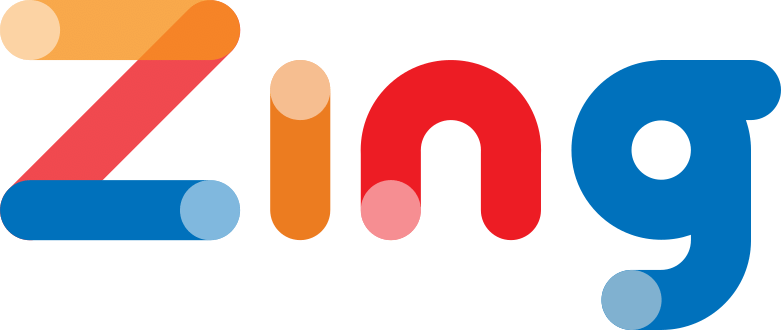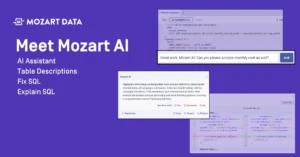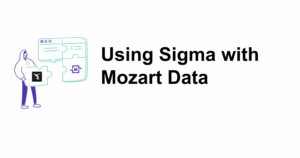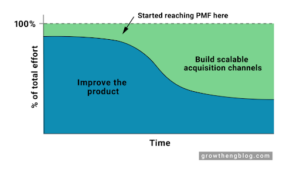
Maybe you’ve traded a stock on your phone using Robinhood, or created a quick design on your phone using Canva? Perhaps you replied to an email, or reviewed a presentation. But up till now, querying data has largely been a ‘desktop only’ activity, generally limited to a BI or data science team.
Zing Data was built because even having a well organized data warehouse with all the relevant data connectors is much more useful if data is accessible where and when you need it.
Zing Data is mobile-first business intelligence borne from heading into a client meeting but not having time to write and debug a query. A fast, easy-to-use mobile app that doesn’t require a manual to use and puts data (not just viewing a dashboard) in the hands of anybody at a company wherever they are.
Is data-anywhere the future?
Most data tools have envisioned data as a desktop-based activity. You write a query, debug that query, and maybe share out a screenshot. But the way people work has evolved. We take work calls muted while on a jog. We work remotely, or on-the-go more because employers have shifted to remote-first or hybrid work arrangements at an unprecedented pace.
Here’s what the data tells us about how people work:
- People in the US spend more than four hours a day on their phone, according to data from data.ai (previously App Annie)
- Google Sheets has 1 BN+ downloads on Android alone! And if you’ve ever tried to use a spreadsheet on your phone, well…sorry.
- More than 76% of Slack weekly active users use Slack on their phone in a given week.
Where are most companies today?
Historically companies fall into one of three buckets:
Data-team focused: A team of business analysts or data scientists helps answer business questions. Typically a business person pings a person on the data team, and those questions are added to a queue.
- Many questions go unanswered since there aren’t many data people relative to the number of questions at a company. Lots of decisions are made without data even though it exists.
- Long lags to update dashboards or make edits because the ‘keys’ to d so are held by a small number of people with the knowledge and software licenses.
Self-serve focused: A lot of companies want to be here. Ideally employees can ask and answer questions on their own using BI tools or if they are more technical, writing the SQL themselves.
- But most employees lack the training to write SQL, or the BI tool training to use data effectively on their own.
- Employees are often not at their desk so need data, but BI tools are not suited to this task. “I get questions from sales people, executives and those questions are coming from them on their phones” said one Head of Business Intelligence at a publicly traded company recently.
Dataless: Without a high level of technical knowledge, a team to handle data questions, or good education / tools, employees make decisions in the absence of reliable data – often relying on intuition or anecdotes.
- Bad decisions get made even when the data exists for a good decision.
- One recent example was a hotel manager telling a customer that no rooms were available for early check-in (which would have netted the hotel more money), but they didn’t have a tool they could use while walking around the hotel lobby.
Creating a data-anywhere culture
Mozart Data has made it possible to pull together disparate data sources – what used to be a months-long IT project of pulling Salesforce, Workday, Stripe, Google Ads, and other data sources into well organized, easily queryable and joinable data repository can now be a couple of hours.
As we saw above, employees are increasingly using their phones to get work done, and with a more normalized business cadence, they’re on the go. They’re meeting with clients, going to off sites, or just living life when they get pinged after hours. Or perhaps they have a large mobile first workforce, like retailers, event organizers, utilities, natural resource companies, or logistics firms.
Many questions do not require a dashboard that will exist for perpetuity – indeed the language of some BI tools of “publishing a dashboard” evokes the time commitment of writing a book. But many questions that come up in running a business are quick questions that ideally should have quick helpful answers to make a business decision.
Zing’s native apps on iOS and Android allow users to query, visualize and collaborate with colleagues from anywhere – even using powerful functionality like calculated fields and custom SQL. Using Zing Data with Mozart means that you can query from any of the hundreds of connectors that Mozart supports in less than 30 seconds.
Zing’s built in query optimizer handles long-running queries (sending you a push notification when they are done), and handles large result sets (automatically applying windowing functions to return the most relevant results on a small screen). If you have too many results to load on the phone will show the highest contributors based on the group eyes that you specify, and give you the option to see the full results or apply additional filters.
Get started with a free trial of Mozart Data here, and a free Zing Data account here.


